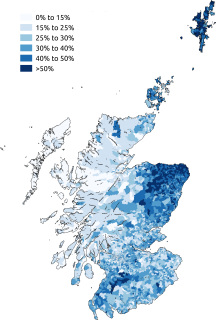Related Research Articles

Doric, the popular name for Mid Northern Scots or Northeast Scots, refers to the Scots language as spoken in the northeast of Scotland. There is an extensive body of literature, mostly poetry, ballads, and songs, written in Doric. In some literary works, Doric is used as the language of conversation while the rest of the work is in Lallans Scots or British English. A number of 20th and 21st century poets have written poetry in the Doric dialect.

Scots is an Anglic language variety in the West Germanic language family, spoken in Scotland and parts of Ulster in the north of Ireland. Most commonly spoken in the Scottish Lowlands, Northern Isles and northern Ulster, it is sometimes called Lowland Scots or Broad Scots to distinguish it from Scottish Gaelic, the Goidelic Celtic language that was historically restricted to most of the Scottish Highlands, the Hebrides and Galloway after the 16th century. Modern Scots is a sister language of Modern English, as the two diverged independently from the same source: Early Middle English (1150–1300).
Lallans, is a term that was traditionally used to refer to the Scots language as a whole. However, more recent interpretations assume it refers to the dialects of south and central Scotland, while Doric, a term once used to refer to Scots dialects in general, is now generally seen to refer to the Mid Northern Scots dialects spoken in the north-east of Scotland.
The Glasgow dialect, popularly known as the Glasgow patter or Glaswegian, varies from Scottish English at one end of a bipolar linguistic continuum, with the local dialect of West Central Scots at the other. Therefore, the speech of many Glaswegians can draw on a "continuum between fully localised and fully standardised". Additionally, the Glasgow dialect has Highland English and Hiberno-English influences owing to the speech of Highlanders and Irish people who migrated in large numbers to the Glasgow area in the 19th and early 20th centuries. While being named for Glasgow, the accent is typical for natives across the full Greater Glasgow area and associated counties such as Lanarkshire, Renfrewshire, Dunbartonshire and parts of Ayrshire, which formerly came under the single authority of Strathclyde. It is most common in working class people, which can lead to stigma from members of other classes or those outside Glasgow.

Foula, located in the Shetland archipelago of Scotland, is one of the United Kingdom’s most remote permanently inhabited islands. Owned since the turn of the 20th century by the Holbourn family, the island was the location for the film The Edge of the World (1937). The liner RMS Oceanic was wrecked on the nearby Shaalds of Foula in 1914.

John Campbell Brown was a Scottish astronomer who worked primarily in solar physics. He held the posts of Astronomer Royal for Scotland, the Regius Professor of Astronomy at the University of Glasgow, and honorary professorships at both the University of Edinburgh and the University of Aberdeen.
Adam Jack Aitken was a Scottish lexicographer and leading scholar of the Scots language.

Shetland dialect is a dialect of Insular Scots spoken in Shetland, an archipelago to the north of mainland Scotland. It is derived from the Scots dialects brought to Shetland from the end of the fifteenth century by Lowland Scots, mainly from Fife and Lothian, with a degree of Norse influence from the Norn language, which is an extinct North Germanic language spoken on the islands until the late 18th century.

The languages of Scotland are the languages spoken or once spoken in Scotland. Each of the numerous languages spoken in Scotland during its recorded linguistic history falls into either the Germanic or Celtic language families. The classification of the Pictish language was once controversial, but it is now generally considered a Celtic language. Today, the main language spoken in Scotland is English, while Scots and Scottish Gaelic are minority languages. The dialect of English spoken in Scotland is referred to as Scottish English.

The School of Law at the University of Glasgow provides undergraduate and postgraduate courses in Law, and awards the degrees of Bachelor of Laws, Master of Laws, LLM by Research, Master of Research (MRes) and Doctor of Philosophy, the degree of Doctor of Laws being awarded generally only as an honorary degree.

The University of Aberdeen School of Law is the law school of University of Aberdeen, located in Aberdeen, Scotland. Established in 1495, it has been consistently ranked among the top 10 law schools in the United Kingdom.

The Scots Wikipedia is the Scots-language edition of the free online encyclopedia, Wikipedia. It was established on 23 June 2005, and it first reached 1,000 articles in February 2006, and 5,000 articles in November 2010. As of June 2022, it has about 41,000 articles. The Scots Wikipedia is one of eight Wikipedias written in an Anglic language or English-based pidgin/creole, the others being the English Wikipedia, the Simple English Wikipedia, the Old English Wikipedia, the Pitkern-Norfuk Wikipedia, the Tok Pisin Wikipedia, the Jamaican Patois Wikipedia, and the Sranan Tongo Wikipedia.
The Faculty of Medieval and Modern Languages at the University of Oxford, England, was established in 1903. It is part of Oxford's Humanities Division.

Sir Ian David Diamond is a British statistician, academic, and administrator, who served as Principal and Vice-Chancellor of the University of Aberdeen until 2018. He became the UK's National Statistician in October 2019.
Murray G. H. Pittock MAEFRSE is a Scottish historian, Bradley Professor of Literature at the University of Glasgow and Pro Vice Principal at the University, where he has served in senior roles including Dean and Vice Principal since 2008. He led for the University on the University/City of Glasgow/National Library of Scotland Kelvin Hall development (kelvinhall.org.uk), the first phase of which was opened by the First Minister of Scotland, Nicola Sturgeon, and has also chaired other major projects on learning and teaching space and Glasgow's unique early career development programme. He has also acted as lead or co-lead for a range of national and International partnerships, including with the Smithsonian Institution, and plays a leading role in the University's engagement with government and the cultural and creative industries (CCIs), organizing the 'Glasgow and Dublin: Creative Cities' summit in the British Embassy in Dublin in 2019, and working with the European network CIVIS on civic engagement. He also produced a major report on the impact of Robert Burns on the Scottish Economy for the Scottish Government in 2020; a Parliamentary debate was held at Holyrood on the recommendations. In 2022, he was declared Scotland's Knowledge Exchange Champion of the year https://insight.kevri.co/scotland-knowledge-exchange-champion/ Outside the University, he serves on the Research Excellence Framework (REF) Institutional Environment Pilot Panel, and the National Trust for Scotland Board, as well as acting as Co-chair of the Scottish Arts and Humanities Alliance (SAHA). He also serves as Scottish History Adviser to the NTS and as an adviser to a wide range of other national heritage bodies and the Scottish Parliament. He is on the Advisory Board of NISE, the Europe-wide platform for research on national identities and is President of the Edinburgh Walter Scott Club in 2019-20 and 2021-22.
Robert John Gregg, known as Bob Gregg or R. J. Gregg, was a linguist, a pioneer of the academic study of Ulster-Scots as well as a linguistic authority on Canadian English.
Joyce Lishman the first woman Professor at Robert Gordon University, was a leader in social work education and research.
Jennifer Smith, PhD, FRSE is a sociolinguistic specialist in language variation and dialects, especially Scottish dialects across the generations and geography of Scotland, including developing the Scottish syntax atlas which analyses the diversity. Her research also covers variations in colonial English, for example, in North America. Professor of Sociolinguistics at the University of Glasgow School of Critical Studies, she teaches and researches language and variation theory.
Angus Mcintosh, was a British linguist and academic, specialising in historical linguistics.
Lorna Anne Dawson CBE FRSE is professor and head of soil forensics at the James Hutton Institute, Scotland, who is an Expert witness, Chartered Scientist, and registered expert with the National Crime Agency. She won the award of Soil Forensic Expert Witness of the Year in the Corporate INTL 2021 Global Awards for her forensic research solving major criminal cases, including the World's End pub murders. She had won a special Pride of Britain Award by The Daily Mirror in 2017, for her role in solving long standing criminal cases, and her science communications. She is a Fellow of the Royal Society of Edinburgh, Commander of the Order of the British Empire, with international academic recognition.
References
- 1 2 "Professor Robert Millar | Staff Profile | The School of Language, Literature, Music and Visual Culture | The University of Aberdeen". www.abdn.ac.uk. Retrieved 2020-08-28.
- ↑ "Scottish Language" – via asls.arts.gla.ac.uk.
- ↑ "Robert McColl Millar". www.amazon.com. Retrieved 2020-08-28.
- ↑ Hendry, Ben. "North-east professor wants to save Scots language from fading into history". Press and Journal. Retrieved 2020-08-28.
- ↑ McCann, Lee. "Speakers wanted for Scots language survey". Evening Express. Retrieved 2020-08-28.
- ↑ McDonald, Karl (2020-08-28). "Scots Wikipedia taken over by American teenager who wrote thousands of 'very odd' articles without learning language". inews.co.uk . Archived from the original on 26 August 2020. Retrieved 26 August 2020.